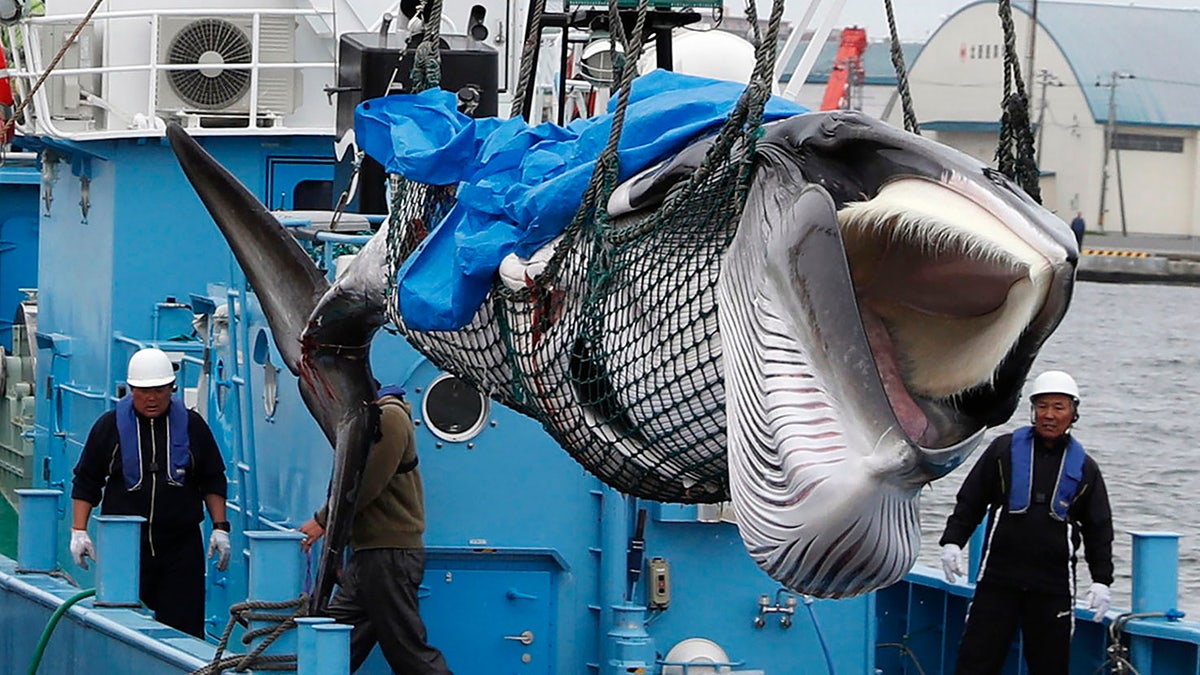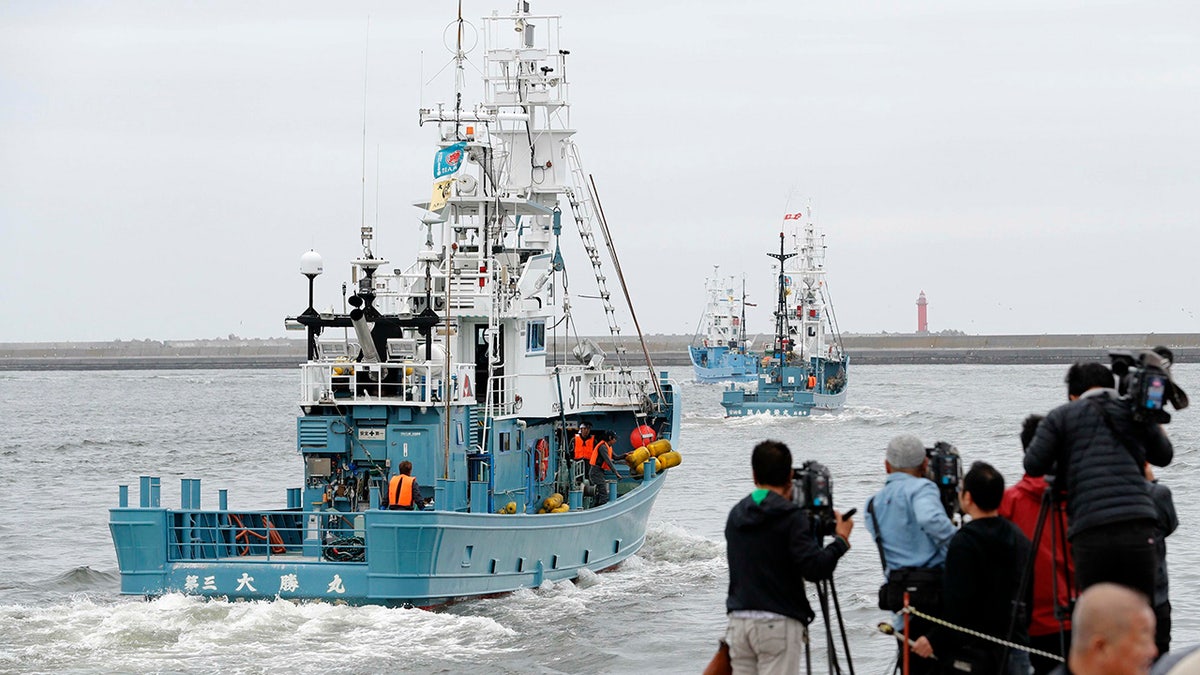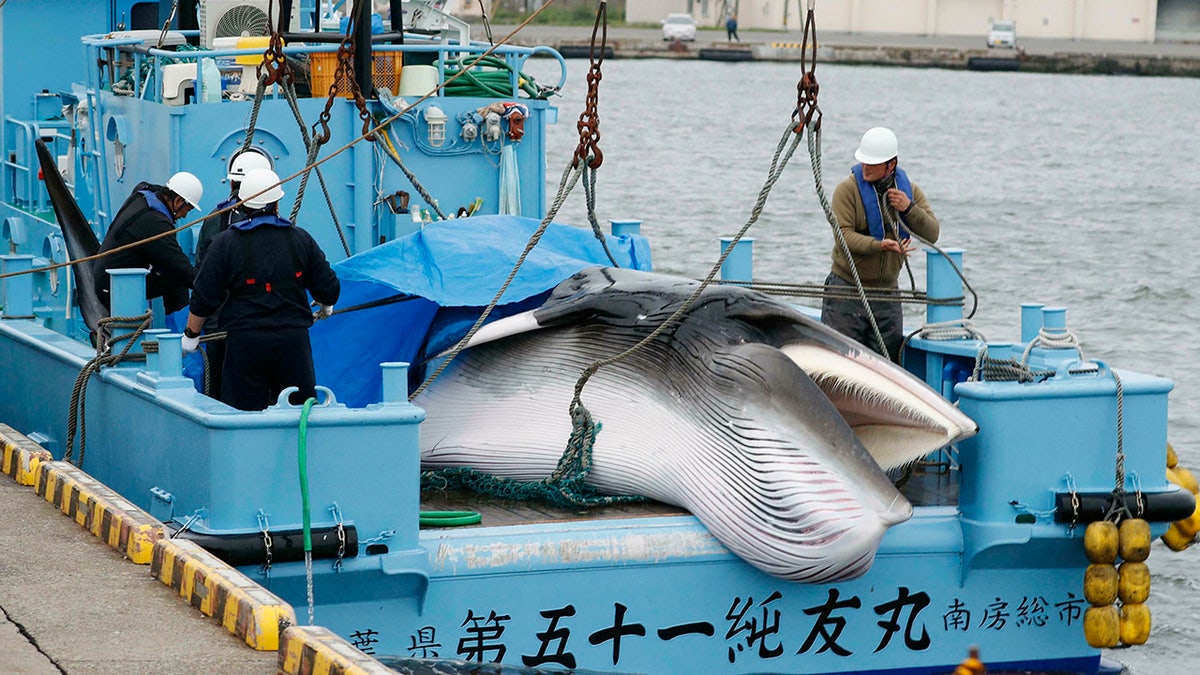Fox News Flash top headlines for July 1
Fox News Flash top headlines for July 1 are here. Check out what's clicking on Foxnews.com
Japanese whalers – with their harpoons concealed beneath tarpaulin – left the port cities of Kushiro and Shimonoseki on Monday for the first commercial whale hunt in more than three decades.
Hours later, the fleet that left the northern post of Kushiro brought back their first catch: two minke whales.
A crane lifted the whales and slowly placed them on the back of a truck to be taken to a portside factory for processing. Workers in blue plastic overalls poured sake onto the first whale to express thanks and celebrate the first catch.
“My heart is overflowing with happiness, and I’m deeply moved,” Yoshifumi Kai, head of the Japan Small-Type Whaling Association, said at a ceremony before the whalers departed. “This is a small industry, but I am proud of hunting whales. People have hunted whales for more than 400 years in my home town.”

A whale is unloaded at a port in Kushiro, in the northernmost main island of Hokkaido, Monday, July 1, 2019. Japan is resuming commercial whaling after 31 years, meeting a long-cherished goal seen as a largely lost cause. Japan's six-month notice to withdraw from the International Whaling Commission took effect Sunday. (Masanori Takei/Kyodo News via AP)
He later added, according to The Guardian: "Today is the best day. It was worth waiting for 31 years."
FLASHBACK: JAPAN SAYS IT WILL RESUME COMMERCIAL WHALING
Monday marked the first commercial whale hunt since 1988, when Japan switched to what is called research whaling after commercial whaling was banned by the International Whaling Commission. Japan withdrew from the IWC last year and it took effect Sunday.
Officials said the catch of the two minke whales was a nice surprise because they were not thought to be in the area and whalers were expecting Monday’s trip to be only ceremonial.
The Fisheries Agency said the hunts will stay within the country’s exclusive economic zone, and the catch quota for the rest of this year will be 227 whales – 52 minkes, 150 Bryde’s and 25 sei whales.
The announcement of the quota was delayed until the conclusion of the G20 summit in Osaka on Saturday in an apparent move to avoid criticism from global leaders.

Whaling boat leave a port in Kushiro, Hokkaido, northern Japan Monday, July 1, 2019. Japan is resuming commercial whaling for the first time in 31 years, a long-cherished goal seen as a largely lost cause. (Masanori Takei/Kyodo News via AP)
The whale meat will be auctioned at a local fish market Thursday and later hit stories, mainly in the region. Whalers are hoping for a special price for the historic meat that is higher than the average 2,000 yen per kilogram ($18 per 2.2 pounds) than their counterparts from Antarctic research whaling used to get.
While the resumption of commercial whaling was condemned by many conservation groups, others see it as a face-saving way to let the government's embattled and expensive whaling program gradually succumb to changing times and tastes.
Despite massive attention, tax money and political support from ruling party lawmakers, whaling in Japan involved only a few hundred people and accounted for less than 0.1% of the total meat consumption in fiscal 2017, according to government data.

A whale is unloaded at a port in Kushiro, in the northernmost main island of Hokkaido, Monday, July 1, 2019. Japan is resuming commercial whaling after 31 years, meeting a long-cherished goal seen as a largely lost cause. Japan's six-month notice to withdraw from the International Whaling Commission took effect Sunday. (Masanori Takei/Kyodo News via AP)
JAPAN'S HEALTH MINISTER INSISTS HIGH HEELS ARE 'NECESSARY AND APPROPRIATE' IN THE WORKPLACE
Under its research whaling, which was criticized as a cover for commercial hunts because the meat was sold on the market, Japan caught as many as 1,200 whales a year. It drastically cut back its catch in recent years after international protests escalated and whale meat consumption slumped at home.
Today, about 4,000-5,000 tons are supplied in Japan annually, or 30-40 grams of whale meat per person a year, Fisheries Agency officials say.
Whales caught in coastal waters will be brought back for fresh local consumption at any of six local whaling hubs that are mainly in northern Japan but include Taiji, the home constituency of ruling Liberal Democratic Party heavyweight Toshihiro Nikai. The town is also known for its dolphin hunts shown in the documentary movie "The Cove."
CLICK HERE TO GET THE FOX NEWS APP
Whaling is losing support in other whaling nations including Norway and Iceland, where whalers have cut back on catches in recent years amid criticism that commercial hunts are bad for their national image and tourism.
Iceland caught only 17 whales, while Norway hunted 432 in the 2017-2018 season, way below their catch quota of 378 and 1,278 respectively, according to the IWC.
Japanese are also beginning to see ecotourism as a better option for whales than hunting them for food.
The Associated Press contributed to this report.









































